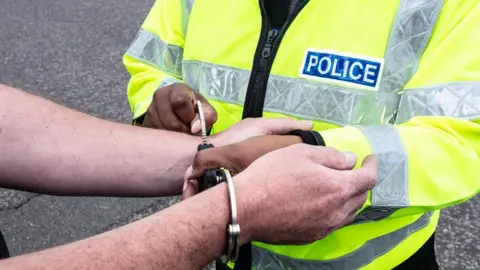Police detainees 'at risk from delayed medication'
 Getty Images
Getty ImagesPeople with health issues held in police custody are "regularly put at risk" because medication is delayed or unavailable, a study has found.
The research, led by Newcastle University in partnership with Durham and Northumbria universities, said forces lacked medical staff in custody suites or followed practices which prevented medications being issued.
One person who had experienced being held in police custody told researchers delays forced people to "suffer in a cell".
A National Police Chiefs' Council spokesperson said it would review the findings.
One interviewee, who was anonymised in the report, said: "They won't give you methadone, let alone phone up the chemist and ask if you're on a prescription and if you are taking your methadone.
"They don't provide you with anything like that, so they make you suffer in a cell - sweating, being sick, diarrhoea. You just want to end your life."
'Recruitment challenges'
Newcastle University senior lecturer Dr Gethin Rees said healthcare provision in police custody "does not meet the standards of Availability, Accessibility, Acceptability and Good Quality, adapted from the Universal Declaration of Human Rights".
"We have provided recommendations that will assist healthcare provider companies and the police to meet these minimum standards," he said.
As part of its recommendations, the team said all healthcare providers should sign up to a standardised medication list and patient group directive, so they can administer medicines to patients who meet specific criteria without a prescription.
It also found challenges in recruiting nurses and paramedics meant often there was not a healthcare provider based in every custody suite. This caused staff to have to travel large distances to reach every patient.
The report recommended medical staff were properly embedded in all custody suites.
It also recommended detainees with drug and alcohol dependencies were regarded as vulnerable people and an appropriate adult was provided to assist them before the police interview.
Sherry Ralph, chief executive of the Independent Custody Visiting Association (ICVA), said the study echoed her organisation's own reports, which found "varying arrangements" for healthcare availability across police forces.
She said gaps in coverages could lead to "long wait times for detainees to see a healthcare professional to discuss their needs".
Follow BBC Newcastle on X (formerly Twitter), Facebook and Instagram.
